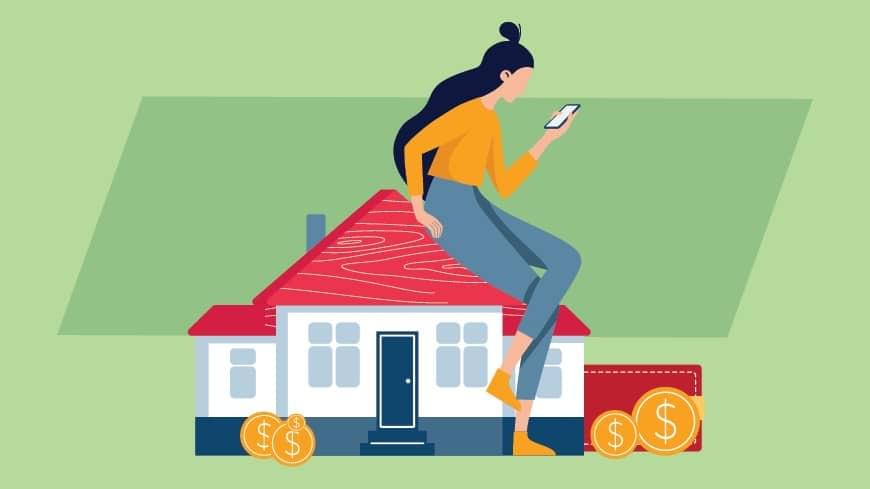Oh no! Your property just got reassessed. Three moves to make now

Homeowners across the United States are basking in the knowledge that the value of their homes have soared in the past year – after all, 94 percent of metro areas in the nation enjoyed double-digit price increases in the second quarter of 2021 compared to the year before.
That’s the kind of news to hearten any property owner. But before they start celebrating, homeowners need to understand a little-considered downside that is likely to stun them: Their property will be reassessed. And a property tax assessment may could lead to you owing more on your property taxes.
What is a property tax reassessment?
Every few years, depending on the municipality or state (and in some cases every year), the value of homes will be examined by a government assessor to see if anything has changed, and their assessed worth will move up or down (it happens automatically if a property is sold).
For those sitting on gains of 20% or more in the sizzling housing market (for example, your house that was worth $400,000 a year ago is now worth $480,000), an upcoming tax bill that includes a reassessment may be a shocker. And with the present $10,000 limit on state and local tax deductions on your federal 1040 form, which became law in 2017, many homeowners won’t be able to deduct large amounts to save some money on their federal taxes.
Consider New Jersey residents. Already afflicted with the highest property tax rates in the nation based on the percentage of the value of the home, in 2020 the average amount they paid in property taxes broke $9,000 for the first time. And there is no other state close to challenging New Jersey for the unfortunate title of highest property taxes around – the average amount of property taxes for the next in line, New Hampshire, doesn’t even reach $7,000.
And it’s not always just a hot housing market that prompts a higher value being placed on your house:
- If you expand your house – say, from 1,500 square feet to 2,000 square feet by adding a recreation room -- or build an in-ground pool, you will owe more in taxes when your property is reassessed. Why? You have added significant value to your home. Not only that, it is likely you needed city approval to make these improvements, so the tax assessor who works for the local government will know about them and reassess sooner rather than later.
- New rooms or amenities aren’t the only changes you can make to your house that will increase your property taxes during the next assessment. Renovations count as well. Renovated kitchens, bathrooms, bedrooms and more will all be taken into account by an assessor.
- A boost in home sales in your neighborhood is also likely to move your number higher. That’s because, especially in this booming housing market, homes are likely to sell quite a bit above their last assessed value. When an assessor checks the latest sales prices of comparable homes around you, your assessed value will rise as well.
- A change in budgeting by state or local governments may not affect the value of your home, but it can raise the property taxes you pay on it, similar to the impact of a higher reassessment. Let’s say a town library that depends on taxpayer money needs funds to expand, or a school district needs to pay its teachers more or a forest preserve wants to buy land adjacent to it. The taxing bodies in all three cases can request an increase in the rate it charges taxpayers – and thus receive more money from homeowners. For example, if your tax rate has been 1% on your $500,000 home, but the various bodies requesting more money boost that rate to 1.5%, you will owe $7,500 a year instead of $5,000 – a significant increase.
At the same time, property taxes have benefits for homeowners. They often pay for essential municipal services, such as police and fire safety. They can be used to ensure trash collection and other benefits of a civilized society. In some states, they are the biggest revenue source to fund public schools and can be used to pay teacher pensions.
But often that is little consolation to the owner facing a much higher tax bill. What can you do to make the best of a property reassessment in a hot market?
3 ways to respond to a property tax reassessment
- Ask for your property tax card
- Check comparable homes
- Appeal the assessment
1) Ask for your property tax card
What is a property tax card, you ask? It is brimming with information about your home. This can include, but is not limited to, the size of your property (the home plus land around it you own), the square footage of each room and improvements made during your ownership.
Assessors fill them out each time they examine your property and file them away, either in a cabinet or by inputting the information into a computer. And since assessors are human, they can make mistakes. Is the age of your house correct? The purchase price? Make sure to check out yours to ensure that the details in the card are accurate.
2) Check comparable homes
In your neighborhood, there are likely homes similar to yours, whether because they have the same number of bathrooms, close to the same overall square footage and the like. The assessed value of your home is aligned closely to comparable homes nearby.
Their assessments should be publicly available via a multiple listing service (MLS) database or your county website depending on where you live (back in the day, local newspapers would print reams of pages providing the assessments of every address in town). If you are uncomfortable figuring it out on your own, you can also ask a real estate agent to conduct a competitive market analysis for a fee.
If there’s a clear discrepancy in the assessed value of your home and a comparable one close to you (within a mile in most cases), it’s time to take the next step.

3) Appeal the reassessment
Let me share the stories of the two times I’ve appealed my property taxes. They are enlightening in different ways.
The first time, I diligently researched comparable homes in my neighborhood. I jotted down square footage, number of bedrooms and other factors designed to make my case. The ones that best proved that my home was assessed too high, I submitted to the county board of review. Later, I was asked to appear before clerks there to hear their final decision on my appeal.
I drove to the offices assuming that they would agree with my sound argument and dismiss me armed with a large reduction in my home’s value. My logic, at least to me, could not be refuted. Instead, their language that day was so specific to the industry, and their justifications for keeping the assessment intact were so confusing, I couldn’t even offer responses to boost my case. I lost the appeal without a fight. I left feeling powerless and determined that, next time, I would not be placed in the same uncomfortable situation.
The second time, having learned a painful lesson, I hired an expert in property-tax appeals. She came highly recommended as someone who had never lost an appeal in about 40 tries. I sent her some basic information, and she visited my home to look it over for perhaps 30 minutes.
After she submitted the appeal to the county, she explained that we would have a call with the clerks at a mutually agreed upon time, and that I didn’t have to say anything; she would take care of the argument on my behalf. On the agreed-upon day, she presented her case to the clerks over the phone as I listened in. She spoke for perhaps five minutes. Without hesitation, they reduced my home value by 12 percent. My taxes went down far more than her fee cost.*
Lesson learned from this fantastic outcome? Make sure to use an expert. Often, he or she will take a percentage of the tax decrease as payment rather than a straight fee, so you really can’t lose. You can also hire an appraiser for a few hundred dollars in most cases. A list of names can be found on the Appraisal Institute website.
A property reassessment can be a shock to homeowners – especially these days during a housing boom. It can upend a carefully constructed budget and bring about unforeseen stress. Still, if it happens, you and other property owners can take a number of steps that may mitigate the severity of the increase in taxes and help them feel more financially secure. It is well worth your time to attempt to challenge the amount the government says your property is worth.
*All scenarios are different. Results not typical.
Rate does not provide tax advice. Contact your tax advisor with any tax-related questions.




